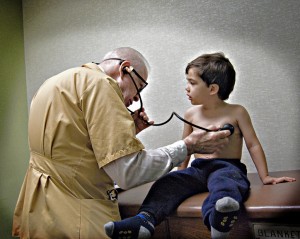"The public thinks that physicians' health and competence is being vigorously monitored and assessed. It isn't," said geriatrician William Norcross. He's the founding director of a UC San Diego program that performs competency evaluations of doctors referred by state medical boards or hospitals. The program -- known as PACE, for Physician Assessment and Clinical Education -- is one of about 10 around the country.
Norcross evaluates 100 to 150 physicians annually and estimates that about 8,000 doctors with full-blown dementia are practicing medicine. (Between 3 and 11 percent of Americans older than 65 have dementia.)
The Effects Of Aging
"Doctors are not immune to the effects of aging," Norcross says, adding that the onset of dementia is often insidious and gradual. Too often, he said, health problems become impossible to ignore after a catastrophic event, such as the death of a patient. "Doctors with cognitive and neurological problems almost never have insight into their problems," he said, and many deny that anything is wrong.
While few experts would argue that age alone should control who can continue to practice, some studies suggest that doctors' skills tend to deteriorate over time. A 2006 report found that patient mortality in complex operations was higher among surgeons older than 60 than among their younger colleagues.
To address the problem in a systematic way, a small but growing number of hospitals -- including those at Stanford and the University of Virginia -- have recently adopted policies requiring doctors over a certain age (70 at U-Va., 75 at Stanford) to undergo periodic physical and cognitive exams as a condition of renewing their privileges.
Diane Pinakiewicz, former president of the National Patient Safety Foundation, a Boston-based information and advocacy group, calls the policies "a fabulous idea" that is long overdue. "Without a rule, it's left to someone's personal decision" to self-monitor.
'Fred Flintstone' Care
Still, some hospital administrators dispute the need for such testing. "In medicine, I think you need to look at people individually," said David Mayer, 59, vice president of quality and safety at MedStarHealth, the largest hospital network in the District and Maryland. "To just put a number there and say, 'You need to be looked at more closely' because of age is not justified."
But Marty Makary, a Johns Hopkins surgeon and author of "Unaccountable: What Hospitals Won't Tell You and How Transparency Can Revolutionize Health Care," says that screening can weed out those who should no longer be practicing while giving "those who are fully functional the freedom to practice without the stigma of ageism."
Although an older doctor can be a font of wisdom and experience, Makary warns that too often patients receive what he calls "Fred Flintstone care" from doctors whose skills have not kept pace. "Some older surgeons are all over minimally invasive surgery," he said, "but many have just ignored minimally invasive techniques." Their patients, he said, may receive state-of-the-art care -- for 1976.
Orthopedic surgeon Ralph Blasier agrees. In a 2009 review article entitled "The Problem of the Aging Surgeon," Blasier wrote that "essentially every treatment technique taught 25 years ago has been abandoned and replaced," including the treatment of traumatic fractures and joint diseases. "All surgical specialties," he continued, "have had similar turnover of treatment methods."
At Stanford, Weinacker, chief of the 1,800-member medical staff, said that reaction to the policy, which affects about 25 doctors, has been mixed. Several doctors, she said, have decided to retire instead of undergoing testing. "I think the main thing I stressed with people was that this policy is intended to be supportive," not punitive. Anyone found to have problems will be referred to the PACE program for a more complete evaluation.
Still Practicing At 101
In the San Francisco Bay Area, rheumatologist Ephraim Engleman will turn 102 in March and said he plans to never quit.
One of the nation's oldest practicing physicians, Engleman drives from his San Mateo home to the UCSF medical campus three days a week. He sees about eight longtime patients per week and spends most of his time directing the Rosalind Russell Medical Research Center for Arthritis, an administrative post he has held since it was created in 1979.
"I'm very much opposed to retirement," said Engleman, an accomplished violinist who plays once a week with a chamber music group. "As long as I'm able intellectually and physically, I'm going to continue." Engleman, who graduated from medical school in 1937, loves being a doctor and said, "I can do everything I ever did." His only impediment, he said, is severe spinal stenosis, which has left him stooped and dependent on a cane. "I walk like an old man," he said.
